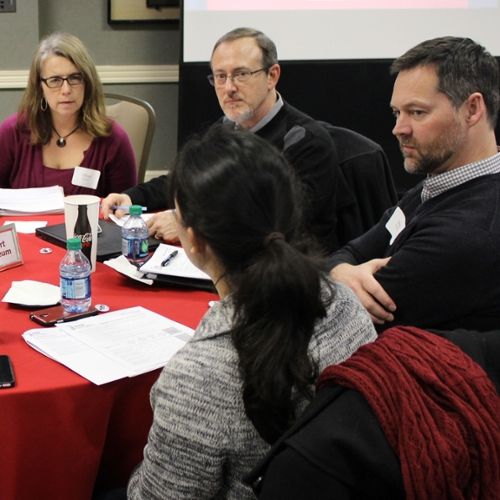Faculty, administrators, staff and students compared their perceptions of IU Bloomington student engagement to the results of the 2015 National Survey of Student Engagement during the first NSSE Summit held on campus on Jan. 28.
Hosted by the Office of the Vice Provost for Undergraduate Education and led by Senior Assistant Vice Provost Judith Ouimet, the summit featured interactive exercises designed to facilitate discussion about the results of the survey and to identify opportunities to enhance student success that align with the university's bicentennial strategic plan.
“The summit is a forum where the campus community tests their awareness of the student experience at IU Bloomington while identifying areas of focus and action strategies to improve student engagement,” Ouimet said. “The data are important, but the way we use the data to make informed decisions offers transformative possibilities.”
IU Bloomington surveys its first-year and senior undergraduate students every three years using NSSE, asking students to report their engagement with faculty, extracurricular activities, school and work practices and other experiences they have on campus. Additional questions gauge how students perceive diversity on campus and their interactions with advisors and other university staff.
Compared to students at peer institutions, IU Bloomington students generally report comparable or somewhat higher levels of engagement and participation in high-impact practices that research has found to be associated with student learning. But student engagement at IU varies from one academic unit to another. And for some activities, seniors report lower engagement levels than first-year students.
The summit provided an opportunity to look more closely at the data, identify areas where IU Bloomington might do better, celebrate success and link the survey results with deliberate practices in an attempt to better serve students.
"The summit was a great opportunity for me to share my story and hopefully help future students who need academic support to be engaged at the right time to help them succeed," said recent graduate Will Germann.
During the summit participants heard from NSSE Institute representatives, who conduct research on student and faculty engagement nationwide from offices housed on the IU Bloomington campus. NSSE director Alex McCormick, associate director Jillian Kinzie and Center for Postsecondary Research director Thomas Nelson Laird explained how NSSE, created in 2000, emerged from a need to understand the student experience beyond reported college ranking figures.
McCormick listed several factors that indicate student engagement, including deep approaches to learning, quality involvement with faculty, enriching activities and a climate of support.
“Optimal education happens when students are both challenged and supported,” McCormick said.
In teams composed of representatives across campus units and programs, participants examined NSSE results and considered how the campus could improve in a variety of areas examined by the survey.
"The NSSE Summit was one of the first times I have experienced a partnership with academic colleagues in investigating how we can improve students’ experiences inside and outside of the classroom," said Steve Veldkamp, assistant dean of students and director of student life and learning.
While discussions about student retention and barriers to completion, academic advising and support, high-impact practices and diversity unfolded, summit leaders recorded team reports for future review and consideration.
“This conversation does not end here,” Ouimet said. “Through thoughtful discussion, we are constructing the foundation for campus-wide initiatives that support the bicentennial strategic plan and improve undergraduate life at IU Bloomington.”
More than 580 universities and colleges in the U.S. and Canada participated in NSSE in 2015. The next NSSE will be administered at IU Bloomington in 2018. Additional information about NSSE is available online.
The summit aligns with several priorities in the university's Bicentennial Strategic Plan, including a commitment to student success.


